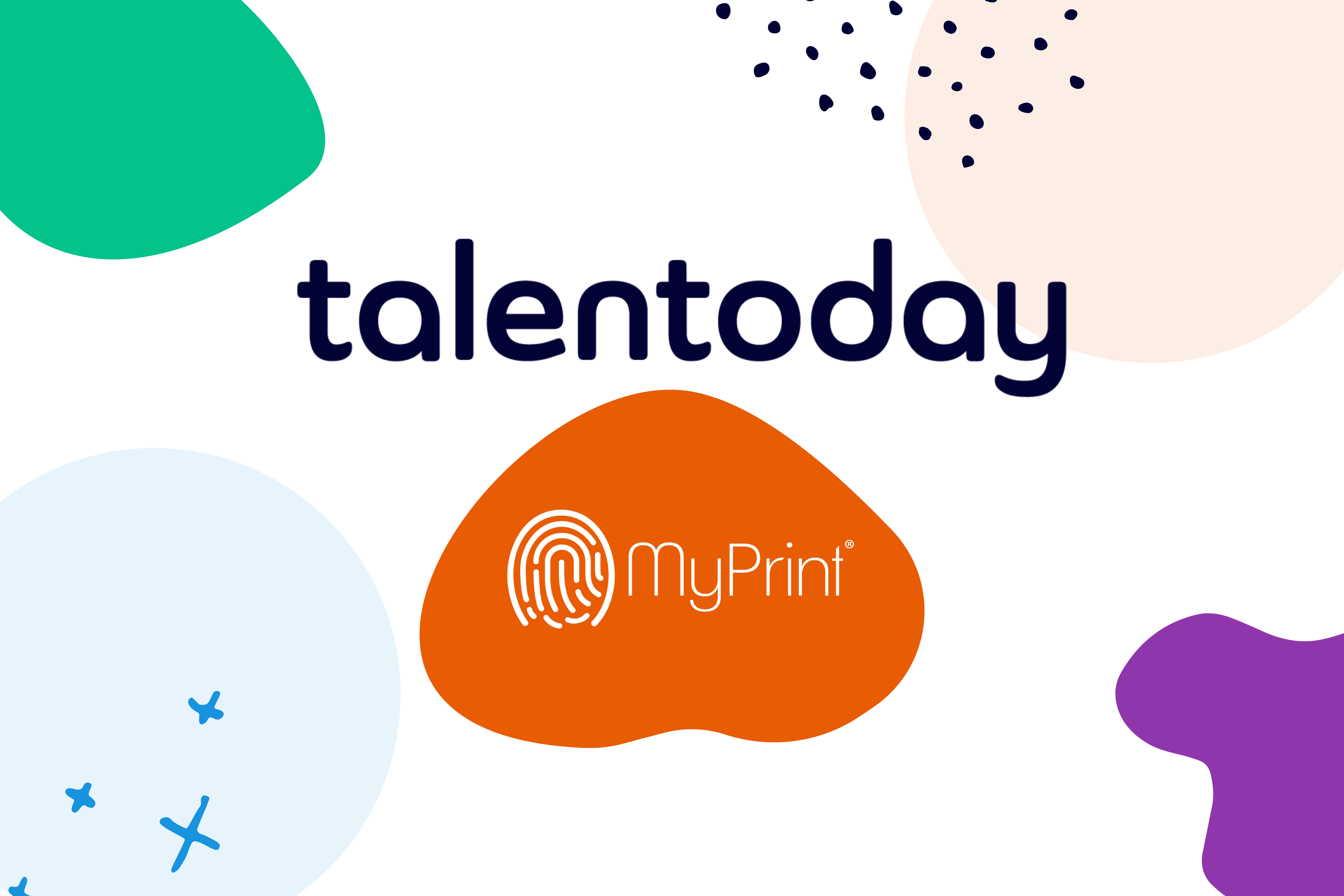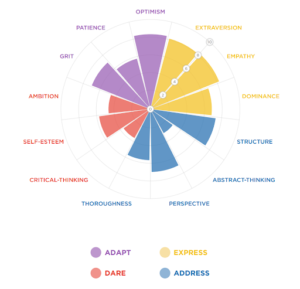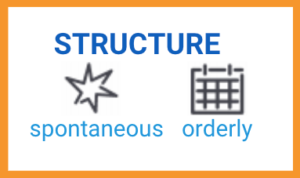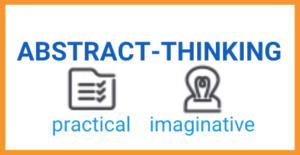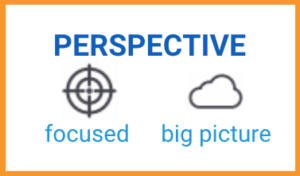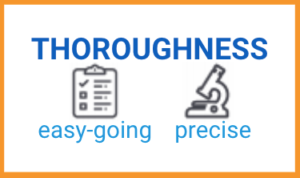3 Misconceptions About Soft Skills
You would be hard pressed to find companies that are not investing in soft skills today. Organizations of all kinds are now recognizing the qualities that formal education and technical training cannot capture within a workforce. Personality traits, motivations and behaviors of employees have taken center stage as employers race to find new ways to attract and retain top talent.
Unfortunately, there are also plenty of misconceptions about soft skills. No, it’s not enough for a company to ask for “team players” with “great communication skills” in a job description; soft skills are much more personal than that. Cultivating a culture centered around empowering individuals to express their true, unique selves requires time and attention.
To get serious about soft skills, it’s time to dispel some of the top myths surrounding them, including that they’re based on gut feelings, less valuable than hard skills and best understood by placing people into groups.
You can't measure soft skills.
How much can a gut feeling really tell you about a person? Due to the influence of a variety of biases, it turns out that the answer is not much! From hyperfocusing on one trait to gravitating toward people like ourselves, human beings can’t help but fall into cognitive traps. Yet, many hiring managers still rely heavily on first impressions and the idea that soft skills are mysterious concepts, incapable of being captured.
Thankfully, this notion is incorrect. By applying the principles of sound science steeped in people analytics, hiring professionals and managers can measure and apply soft skills during the hiring process and when building team management strategies. Personality assessments, when administered thoughtfully, can provide insights that go far beyond gut feeling alone. The best way to cut through unconscious bias in hiring is to provide quantifiable results that can be compared in order to build better teams.
Hard skills are the only requirement for certain jobs.
In many ways, the rise of remote work has been a blessing and a curse. Employers have seen their hiring pool expand now that candidates can come from anywhere thanks to the power of technology. However, a new fallacy has led to a number of failed hiring decisions - “Who needs softs skills when you only work from home?”
This flawed line of thinking can apply to any number of technical roles that might not include some of the outward-facing hallmarks many people associate with soft skills, such as customer service interactions. Contrary to popular belief, soft skills encapsulate the entire scope of personality - from critical thinking to empathy and the need for structure. In short, soft skills are meaningful no matter the role or workplace setting.
Everyone is a type.
You’re probably familiar with personality tests that group individuals together in categories or types. If you’ve ever taken a Myers Briggs, Enneagram or “Which Hogwarts House Do You Belong To?” quiz, you’ve experienced soft skills through what is known as “type theory.”
At Talentobe, we have a saying - show your traits, not your type. Sure, grouping people together in neat categories like ENFJ or Hufflepuff can be a convenient shorthand, but people are more complex than these types give them credit for. When it really comes down to it, individuals most likely land on a scale of gray area than these rigid, black and white designations - and that’s okay! For employers, there’s value in understanding complexity when building teams. This not only improves the ability to get the best work out individuals, but also helps determine the best way for managers and colleagues to work together to achieve goals as a team.
Rethinking Soft Skills
For too long, misconceptions about soft skills have led to poor decision making in team building and management. If businesses are serious about committing to reshaping their workforce, it’s time to ditch gut feelings, stop downplaying soft skills for certain roles and move past type-casting their teams.
Are you ready to start hiring better with science-driven people analytics? Learn how Talentobe’s MyPrint assessment can provide a deeper understanding of your employees personality traits, motivations and behaviors.
Goal Setting Guided by Soft Skills
While there’s never a bad time to set new goals, there sure is something about a fresh new year that boosts motivation! As you take a look at your plans for personal development this year, get a fresh perspective on where you could be going by using your soft skills to guide your goal setting.
Reflect on Where You Currently Stand
When it comes to tackling big goals, it’s important to start with small steps. In order to see how far you have to go, take a look at where you are right now. The skills you possess and the resources you have available can impact the way you set and achieve your goals. Take inventory of what you already have at your fingertips, and keep that into consideration as you determine where you want to go.
Setting Goals with Soft Skills
Next, it’s time to make a plan for what you want to achieve and how you’ll get there. While there are a lot of the goals that might seem like they only require hard skills - such as a certain level of education or required certifications - the truth is that soft skills are the power behind these achievements! By simply being aware of the soft skill strengths you possess, you will be able to better understand how you approach situations and what motivates you, as well as be better equipped to set and reach attainable goals.
Let’s say you want to grow your professional network in the year ahead. Before committing to this goal, it’s important to ask yourself questions about your personality. Are you an introverted person or do you tend to seek a spotlight? If you take the time for self reflection, you can determine what a realistic goal looks like for you and better plan the necessary steps to reach it. For example, if you take a while to warm up around new people, you might make a goal to connect with a certain number of people on LinkedIn each month. However, a more extroverted person might look up conferences or large virtual events that provide an opportunity to dive right into new relationships. Although the end goal is the same, to grow your network, the path to get there might look different from person to person.
Develop a Clear Path Forward
Now that you have a better understanding of where you currently are, take a look at where you want to be and determine a clear path to get there. If you can’t see a plausible way to reach your goal, reevaluate how to set realistic goals in the right direction.
After all, the soft skills you have today can empower your growth tomorrow! Understanding the way you structure your day or what motivates you can help you determine the best way to create a path to your goal. Other goals can be reached by developing soft skills you may not currently use as much. For example, if you have a professional goal to move into a management position at work, you might want to develop some of the most in-demand skills that businesses are looking for when hiring for leadership positions. According to The Balance Careers, these areas of focus can include communication skills, empathy and flexibility.
Whether the path forward utilizes existing skills or is developed with soft skills growth in mind, it’s important to write everything down. Committing to goals mentally is a great first step, but putting them to paper or a digital space helps to make them real. Include checkpoints at regular intervals throughout your journey in order to track progress and adjust goals along the way.
What Are You Waiting For? Get Started!
There’s no time like the present when it comes to self-improvement. Take some time to reflect on the strengths you currently possess, then determine how you can use those skills to get to where you want to be.
Ready to discover your soft skill strengths and improve your goal setting this year? Take our free MyPrint assessment today by clicking here!
The Soft Skills DNA of Remote Workers
Remote workers have taken on growing significance in the U.S. workforce. In fact, a recent poll of employees showed that 39 percent would now consider quitting if their bosses did not provide some sort of work from home option. Clearly, employers need to take remote work seriously as they ponder how to build teams with the future of work in mind.
While remote work had been growing in popularity prior to the COVID-19 pandemic, the global health crisis turned work from home from a nice-to-have option into a necessity for a great deal of companies. The experience highlighted the advantages of a more flexible work environment for many employees and employers alike. However, as with any workplace, some workers adapted more easily to remote working conditions than others. The reason for these differences can be found in the science behind personality traits and workplace motivations.
Remote Work DNA
In an effort to help employers better understand this emerging workforce, psychologists at Talentobe used our Tailored Group DNA tool to create a soft skills model dedicated to remote workers. Users who access this tool within the Talentobe Manager platform will find the predominant personality traits and motivational needs that are necessary for a good adaptation to remote working conditions. Employers can then use this information to compare these benchmarks with the profiles of existing employees and potential job candidates.
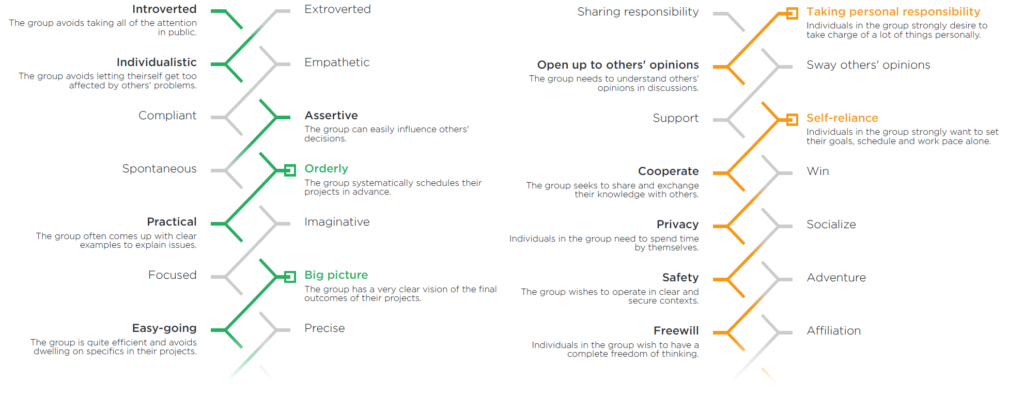
Here’s a preview of our findings:
Predominant Personality Traits
- Orderly: When working from home, it pays to stay organized! This group prefers to schedule projects in advance.
- Big Picture: Even if the home office might be small, the goals for this group are big. Remote workers are more likely to have a clear vision of the final goals of their projects.
- Determined: This group sticks it out when the going gets tough, striving to overcome even the most difficult challenges.
- Positive: A shifting work environment is helped by the right mindset. These individuals have strong confidence in the future.
Predominant Motivations
- Taking Personal Responsibility: Remote workers know that they are the only ones around to hold them responsible for their actions. They tend to keep themselves accountable for their work and decisions.
- Self-Reliance: When you work from home, it pays to be able to set your own goals, schedule and pace of work.
- Personal Achievement: Goal setting is essential when it comes to the flexible work environment. Our research shows this group seeking to achieve highly difficult objectives.
- Intrinsic Enjoyment: When you work alone most of the time, you tend to find motivation from internal forces. Rather than being showered with external accolades, these workers prefer to achieve things for their personal satisfaction.
If recent history is any indication, remote work and other flexible forms of employment are here to stay. Employers looking to build the best teams possible need to start considering more than technical requirements for positions. By applying soft skills research to the hiring and team management process, employers can better predict employee success in a given workplace setting.
Are you interested in learning more about Group DNA from Talentobe? Click here to sign up for your free trial of Talentobe Manager, which includes our Group DNA tailored to the needs of the remote workforce.
How to Cope With Empathy Overload at Work
Do you ever feel like people gravitate towards you to vent? If you hear a coworker telling you about how stressed out they are with their workload, do you offer to lend a hand without considering your own priorities? When making decisions, do you carefully consider the potential impact on others?
If you answered yes to any of these questions, chances are you are a highly empathetic person. The past few months have not been easy for the empaths of the world. Between personal circumstances, situations within your close circle and global events, it is easy to experience empathy overload. It's a condition that can have negative consequences in any setting, especially in the workplace.
Empathy at Work
Every workplace needs empathetic people. In fact, it is often considered one of the most important skills for a successful leader to have. The ability to lead and work with others while anticipating their needs and being aware of their feelings has been shown to have a positive influence on job performance. However, without proper self-care, over reliance on a key soft skill can have negative outcomes.
When empathetic individuals experience a lot of emotional hardships at work, it can lead to burnout. This can come from internalizing the stress of others, having to make important decisions, or even taking on the emotional impact of others’ personal lives. This burnout can lead to a person withdrawing from others, avoiding situations that might create an emotional toll on themselves or even lead to the point of physical distress.
Preventing Empathy Overload
Before getting to the point of empathy overload, take some time to implement some of these preventative measures:
- Practice self-care. Find simple ways to relax and decompress after an overwhelming day. Take a walk, read a book, meditate - find what calms you down and allows you to focus on your own wellbeing.
- Compartmentalize what affects you versus what affects others. It is okay to feel empathy towards others, and it is also okay to take a step back and understand what directly impacts you and what does not.
- Take an objective approach to problems. When making workplace decisions, start by taking an objective look at the facts.
- Be okay with saying no. Empathetic people tend to take on things they cannot handle in order to help others out. It is okay to tell others no sometimes in order to preserve your own energy.
- Communicate your own needs. If you are feeling overwhelmed or burned out, ask for help. Whether this involves pushing back timelines, passing off tasks or taking a day off - let your managers and coworkers know when you need an extra hand.
The World Needs Empathetic People
Feeling like you are overwhelmed by others’ emotions is not a sign of weakness. We need more empathetic people - people who will put the concerns of others first, people who will make others feel seen and heard - in the workplace and in the world. By taking care of yourself and implementing healthy empathy practices, you will be more well-equipped to help others.
Want to learn more about your empathy in a professional context? Take our MyPrint soft skills assessment today at www.talentoday.com.
Welcome to MyPrint: Understanding Your Soft Skills Assessment
The digital world is full of people creating an online persona to market themselves to others in a certain way. Between social media filters, staged photos, and selective sharing of information, what you see is not always the most accurate representation of what a person is truly like. It can be hard to discover your true, unique self, let alone share it with others! That's where utilizing a scientifically-based soft skills assessment can help.
Why are soft skills important?
Here at Talentobe, we love to say that, “Hard skills will get you a job, but your soft skills are what make you great at your job.” Simply said, hard skills are important to get where you want to be in life; earning a degree or certification, gaining work experience, and having the basic knowledge for a position are essential. However, soft skills are the things that will set you apart. How you interact with others, the way you organize yourself and prioritize your work, and being able to adapt to your environment are all examples of soft skills that can lead to career success.
What is MyPrint?
MyPrint is Talentobe’s soft skills assessment that is designed to dive into the personality, motivations, and behaviors that make you unique. The questions are all geared towards the workplace to help you get a better understanding of your soft skills in a professional context.
MyPrint consists of 13 personality dimensions, 11 motivation dimensions, and 11 professional behaviors. The personality and motivation dimensions each have two ends of the scale, called poles, which leads to an output of 26 possible personality traits and 22 different motivators. Each of the professional behaviors has 4 possible styles, leading to information on 44 different behavioral styles. If you’re trying to figure out how many unique results that leads to, we did the math for you: there are over 70.3 trillion possible MyPrint combinations (70,368,744,177,664 to be exact!)
How do I take a MyPrint?
Taking a MyPrint is easier than ever! Simply click here to be taken directly to the registration page. The assessment is free to take, and upon completion you will be able to see your Personality Radar in the application, and your MyPrint One Pager will be available to download.
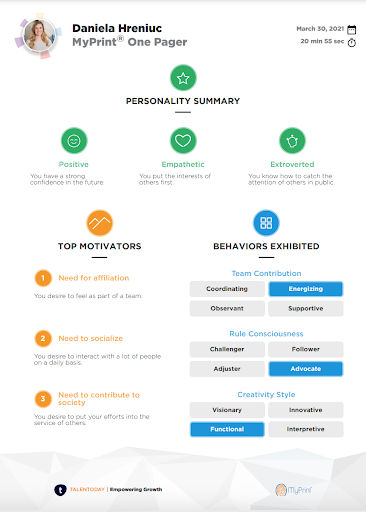
After you have taken some time to view your results, share them! You have the option to share your MyPrint results to multiple social media channels, including LinkedIn, Twitter, and Facebook.
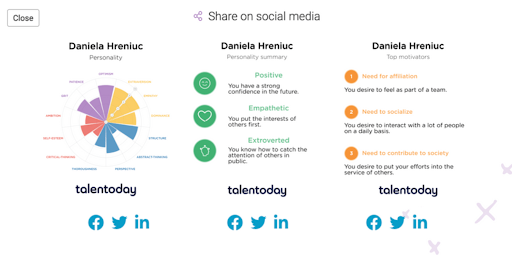
The next time you are looking for a new position, or even looking for more responsibilities or a promotion from your current role, make sure you highlight your soft skills! Use your MyPrint to help showcase the soft skill strengths that make you unique!
Want to learn more about what makes you unique? Visit our website talentoday.com and take a MyPrint assessment today!
How Soft Skills Can Help Students Choose a Major
Making the decision to continue on with your education is a big investment, no matter who you are or what level of education you are pursuing. Even if you are one of the lucky students whose tuition is paid for based on your geographic location or scholarships, the time and work that goes into a successful college career is something that should not be taken lightly.
According to the US Department of Education, 30 percent of students switch majors at least once. Switching majors can be costly and time consuming, so before you just jump into the major that is projected to lead to the highest paying job, here are four steps you can take to make sure it’s the path that is right for you.
Determine which soft skills you already have.
There are so many majors out there that it can be hard to narrow it down. A good place to start is with some self-reflection. Since college is the place to go for the hard skills you will need in your career, one of the best ways to make sure you are choosing the right educational path is to be equipped with the soft skills needed for success.
A good place to start is by thinking of the skills that have made you successful in your previous work and educational experiences. Were you always the organized one in group projects? Maybe your communication skills and patience have helped you in jobs like retail or the service industry. Even the ability to juggle multiple tasks at once can be a key skill that you are already equipped with. Your hard skills will get you the job you are looking for, but those soft skills are what will make you successful in that position.
Which careers need your soft skills?
Once you have taken some time to determine the soft skills that you already possess, a great next step is to find a field or career path that requires those skills. Lucky for you, we have already done some research on this topic at Talentobe! Assessment results from our user database have revealed that there are a lot of soft skills that are transferable across multiple fields. Rather than feeling like your soft skills are narrowing out possibilities, think of them as guiding you in a direction that you will have a natural inclination towards!
Fill in those gaps!
Continuing your education is the time to gain the missing hard skills for your future career, but it’s not too late to develop your soft skills as well. People are dynamic and capable of growth in so many areas of our lives, and your soft skills are no different!
There are a lot of ways that you can work to fill in your soft skill gaps. Being aware of the skills that you want to improve or develop can help you be conscientious about working on those skills. You can also use college to your advantage! Most universities, junior colleges, and online programs offer classes on a variety of topics. Work with an advisor to choose courses that challenge you, rather than opting for ones that already play to your strengths. For example, if you have a knack for research, but have a fear of public speaking, a communication class might be a good fit to begin expanding your soft skills palette.
Take your time.
Lastly, take your time. Although it seems like you need to declare your major immediately, it is okay to do things at your own pace. Most universities will require you to start by taking some general classes of interest before you jump into your declared major. There is no “right” timeline for a decision like this, and it is better to take some time on the front end to make the most of your investment!
Interested in learning more about what soft skills make you unique? Click here to take a MyPrint assessment today!
In Pursuit of Happiness: My Lesson in the Importance of Measuring Motivation
For as long as I can remember, I have had an insatiable urge to maximize my potential for achieving a meaningful and happy life. My mom will recount stories of gritting through the parent-teacher conferences of my adolescence with my teachers cautioning her to put “less pressure” on me due to the intensity I brought to spelling tests and class projects. My mom would assure them that there was no pressure; it was all driven by a little fourth grader with an intense motivation for personal achievement.
Over the years, the devotion to fulfillment of potential never waned. I found myself driven by achievement, influence and responsibility, and I had successfully scouted out professional and educational opportunities to satisfy that. However, I approached a pivotal point in my personal growth when I was by all appearances in the prime of my career, building a life in the United States with a wonderful partner and our loving, loyal pets, leading teams of brilliant people while also pursuing a graduate degree to deepen my business acumen. Yet, somehow, something was missing. As I reached a point along the path I had been going down for years that was supposed to open me up to more in life - more opportunities, more success, more joy, it hit me.
I had been misdiagnosing my motivation. Somehow during the years of chasing personal achievement, my motivational needs evolved. With unique perspectives and education in my toolkit, my new driving force was combating complacency, seeking out new challenges and adventures. My previous solutions for happiness and fulfillment were no longer going to suffice. The cure was taking a hard look at not only who I was, but who I had become, and who I might become next, to truly identify the drivers and motivations that would lead me to a content and happy life.
Defining Motivation
Motivations are often defined as the desires and needs that help determine how an individual behaves. Examples of motivations can include external things, like receiving recognition for your work, or internal factors, such as working on projects that challenge you. When these different needs are met, we become more engaged. This leads to more energy, commitment and creativity, as well as higher levels of productivity and satisfaction.
Motivation is most often discussed in professional settings, and with good reason; companies are always searching for new ways to encourage their employees to achieve more. However, recent research from Gallup indicates that about 80 percent of the global workforce is not engaged in their work. The cost of this mass malaise goes well beyond dollars and cents, with effects that touch our lives outside of the workplace, as well.
Motivations Mean Something Different for Each of Us
In the spring of 2019, I had just finished earning my executive MBA and was ready for a new challenge. After more than a decade spent building my reputation as a detail-oriented marketing professional, I needed to add some variety and excitement to my career. The previous summer, Medix, the U.S.-based workforce solutions company I had spent my entire career with up until that point, had acquired Talentobe, a science-driven people analytics company headquartered in Paris, France. It was a bold step forward for a company I thought I knew like the back of my hand. Was this new opportunity the spark I had been searching for? Ready to take on a new adventure, my husband and I packed up our bags and our pets and made the move from Chicago, Illinois to Paris.
Throwing caution to the wind to cross the Atlantic was energizing and fulfilling for my need for personal challenge. Working with individuals who had different backgrounds than my own and taking on obstacles that I had never faced was by definition challenging, but thrilling at the same time.
At that time, I also came to the realization that this wouldn’t have been the case for everyone in this same scenario. Another professional who was instead motivated by consistency in procedures, attainable goals or predictable environments might have struggled with such a dramatic career change. To me, the lesson was clear. If most companies give employees frequent recognition, bonuses or other types of incentives, then why are the majority of us not engaged at work? This is where things get personal. In order to properly motivate someone, you need to know what it is that inspires them!
Share Your Motivations!
Whether you are setting professional or personal goals, there are the standard questions that are covered on a regular basis. How much do I need to earn to live comfortably? How hard do I need to train to hit my fitness goals? What’s my five-year plan?
Unfortunately, we very rarely ask ourselves direct questions about whether we are feeling fulfilled and, if not, what the factors are that are discouraging us. Only after identifying our core motivations can we turn this attention outward in order to inspire and encourage those around us.
Being transparent about our differences in motivations is an essential first step to better engaging with those around you on their own terms. Sharing individual needs and making that a regular part of the conversation is going to not only help your colleagues and loved ones feel seen and heard, but it’s a practice that promotes wellbeing in every facet of life.
People Change, and So Do Motivations
When I first moved to Paris, I was invigorated by my new environment. I was taking on a new industry in a new country with a new team. However, within a few months, I started to experience that feeling again that something was missing, that something was holding me back from true happiness. I knew I couldn’t give my best effort to those counting on me without figuring out what needs weren’t being met to ensure personal fulfillment.
Working at Talentobe, I thankfully was surrounded by resources dedicated precisely to this mission. I had access to an assessment built on the science of psychometrics designed to unearth insights on your personality, motivations and behaviors as an individual. When I had first stepped into my new role, I had taken the assessment to get a better sense of our product offering. To my surprise, I actually ended up learning a lot about myself along the way. After retaking it, I learned something new - people change, and so do our motivations.
While I was once motivated by change, my heart and science were telling me these needs had evolved. With a major life and career shift satisfying my previous need for challenge and excitement, my need for a sense of belonging grew. When I was back home in the U.S., it was effortless for me to pick up the phone to check in with my mom or grab lunch with a friend. Now, with an ocean between us, that was no longer possible. Once I realized what was missing for me in France, I focused on creating that sense of family I was longing for with my new teammates and put more effort into regularly keeping in touch with my loved ones back home.
Human beings are constantly evolving with their environment, and the same goes for our motivations. This is why it is important to continuously check in with ourselves, the people we work with and those who are with us at our most vulnerable moments to ensure that we are adjusting along with these evolutions. Changes in perspective can also lead to changes in priorities. Once you’re cognizant of this and make a point of keeping your finger on the pulse of these motivations, you’ll be more successful in regulating your environment, activities and life to achieve true happiness and fulfillment.
This article originally appeared on the Bonjour Sophy blog. Bonjour Sophy, a Talentobe partner, is a program that helps individuals discover their life mission. Learn more by clicking here.
Unpacking Your Personality: How Do You Address Tasks and Projects?
Even if you think that you know a lot about yourself and your personality, it is always good to be open to an unbiased opinion about how you respond to the world around you. This can include how you interact with others in class or during meetings, the way you handle pressure of deadlines or tests, and how you organize projects. Taking a personality or soft skills assessment, like MyPrint, can help to uncover strengths you were unaware of or reinforce what you already knew.
What are your strengths and how do you use them on a daily basis? Are there any skills that you are missing or want to improve upon? These are just a couple of the questions that you can ask yourself to get the most out of your soft skills assessment results.
Understand how you approach tasks and projects.
Personality and soft skill assessments help us understand ourselves better by using basic psychological models, such as the Big Five Model of personality. At Talentobe, we have organized our personality dimensions into four groups, called the personality axes, to show how understanding your different traits will empower you to navigate your day-to-day life using science and technology. The four personality axes in MyPrint help us understand how we interact with other people (“Express” - yellow), our tasks and projects (“Address” - blue), ourselves (“Dare” - red), and our environment (“Adapt” - purple).
The Address section of the personality axes is helpful for understanding the way someone approaches issues and undertakes their tasks or projects. This can be beneficial when starting a fresh school year or new job, or if you’re just generally interested in making meaningful improvements in your day-to-day responsibilities.
The four personality dimensions that make up the Address axis are: Structure, Abstract-Thinking, Perspective, and Thoroughness. Being on the high or low end of each of these dimensions does not make you better or worse at planning or conducting your tasks; rather, it helps you to understand your strength in each of those areas so that you can lean into the things you are good at, while pinpointing the areas in which you may want to improve. Remember, you can always leverage an assessment to help understand your personality with an unbiased, scientific approach.
Structure
The two ends of the structure dimension are Spontaneous and Orderly.
If you are a spontaneous person, then you are naturally intuitive. You like to stay flexible in your schedule by avoiding planning things too far in advance, and you often leave a lot of room for improvisation in your working methods. If you are finding that you need a little bit more structure when organizing your week, start by writing down your most important objectives, and do your best to accomplish those even if other things come your way.
On the other end of the structure dimension are the orderly people. If you are orderly, then you are very organized and show no tolerance of ambiguity in your work. You always plan your tasks and projects well in advance and rarely deviate from your schedule. Although this may seem like it is the best way to organize and plan, there are certain times when flexibility is beneficial. When creating your to-do list, determine what is an absolute priority and what you can be flexible with; stay open to opportunities that may come your way.
Abstract-Thinking
The two ends of the abstract-thinking dimension are Practical and Imaginative.
If you are a practical person, you are realistic and don’t like to waste too much time wondering why things are the way they are. You rely on concrete examples to solve issues. If you find yourself stuck when working on an assignment, try to tap into your imagination a little bit. Think of some out-of-the-box ideas for your projects that you might not normally entertain.
On the other end of the abstract-thinking dimension are the imaginative people. If you are imaginative, you often conceptualize problems and try different approaches in order to solve them in the most relevant, but not always the most realistic way. Imaginative people are very creative, but if you find yourself unable to solve an issue, try to only look at what resources and solutions that you actually have available.
Perspective
The two ends of the perspective dimension are Focused and Big Picture.
If you are a focused person, then you are action-oriented. You probably prefer to concentrate on achieving short-term results, rather than spending time to anticipate their future implications. While it is beneficial to focus on those immediate outcomes, there is also a lot to be learned when looking at the long-term impacts of what you are doing. When learning something new or working on a project, think about the relevance and meaning it will have a few years into the future.
The other end of the perspective scale is where the big picture thinkers are. If you are big pictured, you are naturally thoughtful in your work. You will anticipate the long-term consequences of what you are doing as much as possible to have a clear vision of the final outcomes. At times it can be exhausting to think about the future when there is so much uncertainty. If you find yourself being overwhelmed by this, try to focus on the pieces of a project that you can immediately impact regardless of their long-term implications.
Thoroughness
The two ends of the thoroughness dimension are Easy-Going and Precise.
If you are an easy-going person, you are typically tolerant of imperfections. You prefer to value your productivity at work by focusing on the bottom-line, rather than dwelling on every little detail. Having a quantity-centered approach to your work can be beneficial at times, but it is always good to be cognizant of which projects might require a little more attention to detail. When these types of projects come up, schedule some extra review time into the end of your day!
On the other end of the thoroughness dimension we have the precise folks. If you are a precise person, you are naturally diligent. You set high-quality standards for your work and spend time to refine it. However, sometimes it is hard to turn off the ‘perfectionist’ switch. Determine which areas of your work need the extra attention to details, and try to only spend the necessary time on the rest.
Putting it all into action.
Now that you know a little more about the personality traits used to understand how you take on tasks and projects, as part of MyPrint’s Address dimension, it is time for you to take action. If you haven’t taken a MyPrint just yet, you can take it for free in just 25 minutes! There are many other helpful insights besides the ones we discussed here, such as what motivates you, or getting a better understanding of your professional behaviors. Take a look at which soft skill strengths you have and what motivates you, and use that information to help you improve as you take on your next project!
Letting Your Personality Shine in a Remote Work World
How do you remain unique in a remote work world? In the pre-pandemic workplace, many of us may have taken the casual ways of letting our personalities shine at work for granted. You probably didn’t even think twice about it as it happened! Maybe you were the social butterfly stopping by multiple desks en route to your own. Maybe you were the ‘first in and last to leave’ person who was always striving for the next career opportunity. Whatever style you worked with, there were little moments each day to bring your identity to life.
Now, the expansion of work from home opportunities has changed the ways we interact. How do you show who you truly are through small screens connected by the internet?
Although it requires more work to let your personality shine in a remote environment, technology has made the transition a little less painful. They may not be the same as those face-to-face interactions, but our virtual personalities are just as important!
Make meetings work for you.
Meetings have not disappeared from office culture in the last year, but they certainly have evolved. Video calls underwent an unprecedented expansion during the COVID-19 pandemic, For example, Zoom reported growing from 10 million peak daily meeting participants in 2019 to 300 million by April 2020. While virtual meeting tools may have helped to keep teams connected during this time, the repeated virtual interactions on screen can take a toll even on the most outgoing of people. Is it any shock that ‘Zoom fatigue’ quickly became a part of our vernacular?
These countless virtual meetings present new challenges, including finding ways to you distinguish yourself from the faces staring back at you from the video grid. If you are a social person, try logging in a minute before the meeting starts. This way you can greet people with some small talk as they join in the meeting. For our curious individuals out there who like to learn new things or ask a lot of questions, if the virtual meeting doesn’t allow for your normal cadence, take notes with your thoughts and questions and send them to the meeting host in an email at the end of the call. For our introverted folks, it’s always okay to turn the camera off and stay muted every now and then.
In other words, make these video meetings work for you!
We are used to adapting to multiple personality types in a conference room, so this adjustment to accommodating multiple personalities in the virtual space is something we are all learning together. If you find yourself in a position where this format is hindering your work performance or wellbeing, talk with your manager or HR department to discuss potential adjustments.
Email is still essential.
Email may not have ever been the working world's favorite way to communicate, but at least there were opportunities to smooth out unclear communication and tension face-to-face in the office. Now, our virtual communication is often lacking that in-person context or interaction, and we find ourselves communicating complex messages via text alone.
If you are a straightforward or direct communicator, your emails might come across as being abrasive if you don’t have the ability to smile at the recipients as you pass each other in the hallway later that day. In this situation, you would want to make sure that you include some warm greetings or salutations to your emails.
Are you or someone you know an "email blackhole?" This phenomenon can be described as an inbox where messages are sent, but no replies ever return. If this sounds like you, it may be time to reconsider your approach to email! In a physical work environment, a lack of responsiveness could be a minor annoyance. However, when your coworkers are dependent on emails as a main form of communication, you might need to shift your email personality to being quicker with follow-up.
While email has long been the go-to virtual setting for sharing our work personalities, it’s only becoming more essential as teams embrace hybrid and remote settings. Before sending that next message, take a moment to consider how to personalize your text communications.
Be transparent.
The most important aspect of any relationship or work environment is transparency. Although you might need to work a little bit harder to let your personality come through in a virtual space, stay true to your authentic self. Check in with yourself regularly, and communicate with your boss or coworkers if you feel as though your personality strengths or motivations are not being used or met. By doing this, you will allow yourself to not only be fulfilled in your work, but also help to form an environment that you can perform the most effectively in.
Rethink your office culture.
Historically, office culture has started in the physical environment. We create a ‘second family’ at work by getting to know our coworkers through team building activities or simply chatting over a cup of coffee. As offices continue to embrace hybrid and remote work models, the idea of building culture on the basis of these social interactions alone may be on the way out,
Now more than ever, the organizational culture you are a part of has the ability to develop and grow in any direction you choose. Take this opportunity to really understand your personality strengths and what motivates you, and curate a culture with your virtual team to ensure you are and finding purpose in your work!
Want to learn more about your personality strengths and workplace motivators? Click here to take a MyPrint!
Are Your Personality Traits Right for Your Career Path?
Long gone are the days of separating “life” and “work” into two separate buckets hoping to achieve some sort of balance. Employers and employees alike are now becoming increasingly aware that the personality traits that make each of us unique at home are the same things that can make us successful in the workplace. This shift has been highlighted as the effects of the COVID-19 pandemic further blur the line between professional and personal.
Now, instead of simply checking boxes of required technical abilities and education, job seekers are having to ask themselves deeper questions about their personalities. These questions can include:
“Am I more reserved around new people or do I feel at ease when I’m in the spotlight?”
“Am I comfortable when things are not organized or do I prefer instructions in unfamiliar situations?”
“Do I simply focus on getting a task done or do I take time to focus deeply on the details?”
This amount of self reflection can be overwhelming when there’s a ticking clock for finding work! How can job seekers better understand themselves in order to prepare for the new world of job searching? Thankfully, there is more information than ever to identify which personality traits are more likely to lead to success in a given career path.
Identifying Your Personality Traits
Most job seekers are familiar with the standard questions they’ll likely face in a job interview, such as, “What are your strengths/weaknesses?” However, it’s all too easy to fall into the trap of telling meandering stories that are heavy on details but light on proven takeaways.
What hiring managers are really looking for in job interview responses are what are known as, “transferable skills.” These are the types of skills that are not specific to a single industry or role. Rather, transferable skills — such as personality traits — can be used in a variety of settings.
In order to go deeper when identifying your transferable skills, consider taking an assessment backed by science, such as MyPrint®! Supporting anecdotal evidence from your experiences with tools built on data-driven people analytics can add credibility to your claims. Furthermore, the MyPrint assessment evaluates individuals on 13 distinct dimensions of personality, and gives information on 26 total personality traits. Pinpointing your personality traits can help narrow your job search to roles that are more likely to be the right fit for your career.
Popular Fields and Noteworthy Personality Traits
Once you have a better understanding of the personality traits that make you unique, it’s time to connect them to jobs that will allow them to shine! Based on our Talentobe user database, here are the key personality traits that align with 14 of the most in-demand career paths today:
- Administrative: Compliant, Structured, Conventional Thinker, Practical
- Art Design: Imaginative, Spontaneous, Critical-Thinker, Precise
- Education: Empathetic, Modest, Extroverted
- Engineering: Precise, Confident, Determined, Positive, Individualistic
- Finance/Bank/Accounting/Audit: Confident, Positive, Relaxed, Determined, Individualistic
- HR/Purchasing: Positive, Extroverted, Confident, Striving
- Health and Social Care Provider: Empathetic, Extroverted, Imaginative, Big Picture, Striving
- Information Technology: Confident, Relaxed, Positive, Striving
- Legal: Determined, Relaxed, Big Picture, Compliant
- PR/Writing/Editing: Empathetic, Imaginative, Extroverted, Spontaneous
- Production: Positive, Practical, Confident, Extroverted, Striving
- Research Science: Critical-Thinker, Imaginative, Assertive, Big Picture
- Sales: Extroverted, Practical, Positive, Determined, Striving, Patient, Confident
- Security: Confident, Positive, Relaxed, Striving, Assertive, Determined, Practical
Do any of these personality trait groupings sound like you? If they do but you’re currently on another path, it might be the right time to consider a change! With the transferable skills needed for a successful foundation, all that’s left is to fill in the hard skills gaps you may be missing. If you’re currently working in any of the fields above and are lacking some of the soft skills that are prominent in your position, that’s okay too! This is the perfect time to start developing your strengths in the areas critical to your industry.
Are you interested in learning more about the personality traits that make you…you? Click here to take MyPrint and receive a detailed assessment of your unique personality, motivational and behavioral traits! Then, you’ll be able to use that information to connect your unique strengths to today’s most in-demand jobs.




